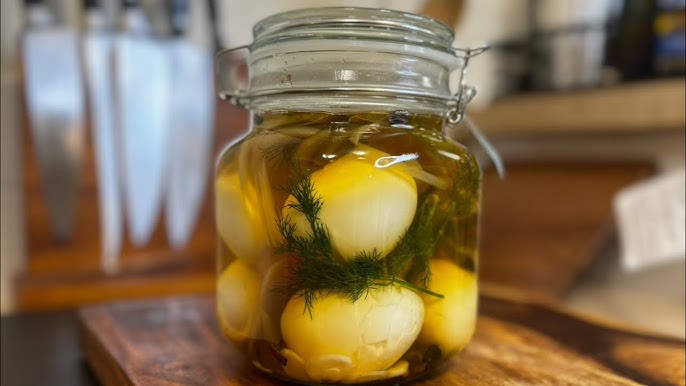Pickled Eggs Recipe: Pickled eggs are hard-boiled eggs preserved in a flavorful brine made from vinegar, water, salt, and various spices. This timeless snack boasts tangy, savory flavors, making it a beloved treat across cultures.
A Brief History of Pickled Eggs
Originally a preservation method, pickling eggs dates back centuries. Sailors and travelers used pickled eggs as a non-perishable protein source, while different cultures added their unique twist with spices and herbs.
Why Pickled Eggs Are Popular Today
In modern times, pickled eggs have made a comeback as a trendy appetizer and snack. Their versatility in flavoring and ease of preparation make them perfect for home cooks and culinary enthusiasts alike.
Benefits of Making Pickled Eggs at Home
Health Benefits
Pickled eggs are packed with protein and low in carbs, making them a great snack for those on keto or low-carb diets. The vinegar in the brine also offers probiotic benefits.
Cost-Effectiveness
Store-bought pickled eggs can be expensive, but making them at home is budget-friendly. You can save money while enjoying high-quality, fresh ingredients.
Customizable Flavors
Homemade pickled eggs allow you to experiment with spices, herbs, and other flavor enhancers. Want a fiery kick or a hint of sweetness? The choice is yours!
Ingredients for Pickled Eggs
Basic Ingredients Required
- 12 large eggs (hard-boiled and peeled)
- 2 cups vinegar (white or apple cider)
- 1 cup water
- 1 tablespoon salt
- 1 tablespoon sugar (optional)
- Spices like mustard seeds, peppercorns, and bay leaves
Optional Ingredients for Flavor Variations
- Chili flakes for spiciness
- Beet juice for a vibrant color
- Garlic cloves and dill for a classic taste
Tools and Equipment You’ll Need
- A large pot for boiling eggs
- Glass jars with airtight lids
- A saucepan for preparing the brine
Step-by-Step Guide to Making Pickled Eggs
Step 1: Boiling and Preparing the Eggs
- Place eggs in a large pot and cover them with water.
- Bring the water to a boil, then reduce heat and simmer for 10 minutes.
- Transfer eggs to an ice bath to cool. Peel them carefully once they’ve cooled.
Step 2: Preparing the Pickling Brine
- In a saucepan, combine vinegar, water, salt, sugar, and spices of your choice.
- Bring the mixture to a boil, then simmer for 5 minutes.
- Let the brine cool to room temperature.
Step 3: Combining Eggs and Brine
- Arrange peeled eggs in sterilized glass jars.
- Pour the cooled brine over the eggs, ensuring they’re fully submerged.
- Seal the jars tightly with lids.
Step 4: Storing and Waiting for Perfection
- Store the jars in the refrigerator for at least one week.
- For the best flavor, let the eggs pickle for 2-4 weeks before serving.
Different Variations of Pickled Eggs
Spicy Pickled Eggs
For those who love a fiery kick, spicy pickled eggs are a must-try. Add chili flakes, fresh jalapeño slices, or a splash of hot sauce to your brine. The longer they sit, the spicier they get, so tailor them to your heat tolerance!
Sweet and Sour Pickled Eggs
Sweet and sour pickled eggs are perfect for those who enjoy a balance of flavors. Add more sugar to the brine and incorporate sweet spices like cinnamon or allspice. These are especially popular as a snack or addition to salads.
Beet-Pickled Eggs
Beet-pickled eggs are a visual and culinary treat. Adding beet juice to the brine gives the eggs a stunning pink hue and a subtly earthy flavor. These eggs are great for festive occasions or as an eye-catching appetizer.
How to Store and Serve Pickled Eggs
Proper Storage Guidelines
Pickled eggs must be refrigerated at all times to ensure safety. Store them in a glass jar with a tight lid to prevent contamination. For optimal flavor, consume within 3-4 months, although they’re often safe to eat longer if stored properly.
Creative Serving Ideas
- Slice them over salads for a tangy twist.
- Use them as a topping for avocado toast.
- Serve them as part of a charcuterie board.
- Pair them with crackers and cheese for a quick snack.
Pairing Pickled Eggs with Other Dishes
Pickled eggs are incredibly versatile. They pair well with sandwiches, grilled meats, or even as a unique addition to ramen. Experiment and find your favorite combination!
Troubleshooting Common Issues
Cloudy Brine
Cloudy brine is usually caused by impurities or improper sterilization of jars. Always use clean jars and high-quality vinegar to prevent this.
Off Flavors
Off flavors can result from using spoiled eggs or improper seasoning balance. Ensure your eggs are fresh and adjust the brine ingredients to suit your taste.
Egg Texture Problems
Rubbery or overly firm eggs often come from overcooking. Boil your eggs just until fully cooked and cool them promptly in an ice bath.
FAQs about Pickled Eggs Recipe
What are pickled eggs?
Pickled eggs are hard-boiled eggs that have been cured in a mixture of vinegar, salt, spices, and other flavorings. They are a popular snack or side dish that can be enjoyed at any time of the year.
How long do pickled eggs last?
When stored properly in a refrigerator, pickled eggs can last for up to 4 months. Ensure that they are kept in a tightly sealed container and fully submerged in the pickling solution.
Can I use apple cider vinegar for pickling eggs?
Yes, apple cider vinegar can be used for pickling eggs and adds a milder, slightly sweet flavor compared to white vinegar. It’s a great alternative for those who prefer a less sharp vinegar taste.
Do I need to boil the vinegar mixture before pickling the eggs?
Boiling the vinegar mixture with spices allows the flavors to meld and intensify, which can enhance the overall taste of your pickled eggs. It also ensures that the vinegar is hot enough to begin the pickling process immediately.
What are some common spices and ingredients used in pickling eggs?
Common ingredients for enhancing the flavor of pickled eggs include garlic, dill, chili peppers, bay leaves, and peppercorns. You can experiment with different spices to find the combination that best suits your taste.
Are pickled eggs safe to eat?
Pickled eggs are safe to eat if they are prepared and stored correctly. Always use clean and sterilized jars, and ensure eggs are fully cooked and handled hygienically to avoid the risk of foodborne illnesses.
How long should pickled eggs sit before eating?
For best flavor, let your pickled eggs sit in the refrigerator for at least one to two weeks before consuming. This waiting period allows the eggs to fully absorb the flavors of the pickling solution.
Conclusion
Pickling eggs at home is a rewarding and enjoyable process. Not only do you save money, but you also get to explore a wide range of flavors tailored to your preference. Whether you prefer spicy, sweet, or classic pickled eggs, the possibilities are endless. So why not give it a try? Start your pickling journey today and enjoy this timeless snack whenever you crave a protein-packed treat.



